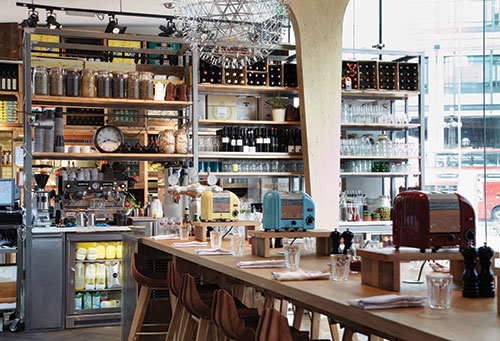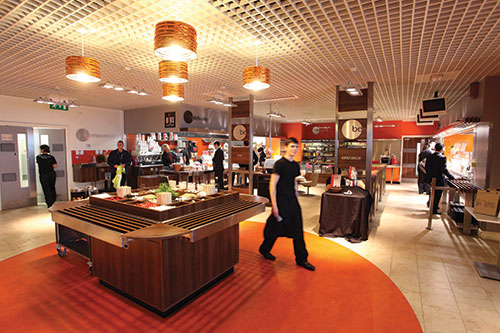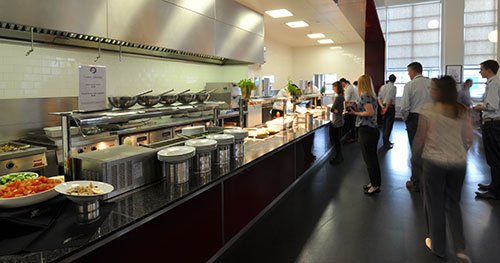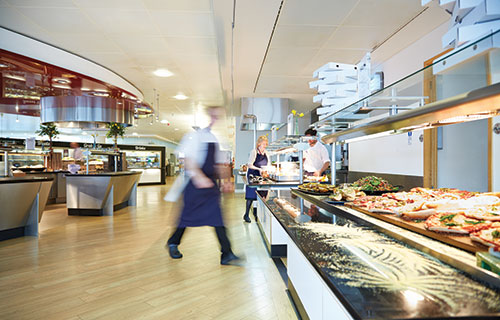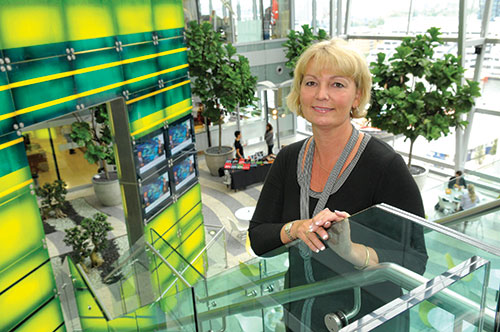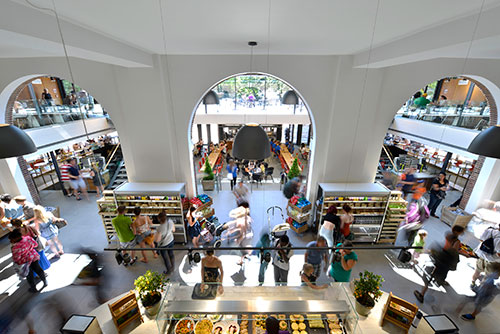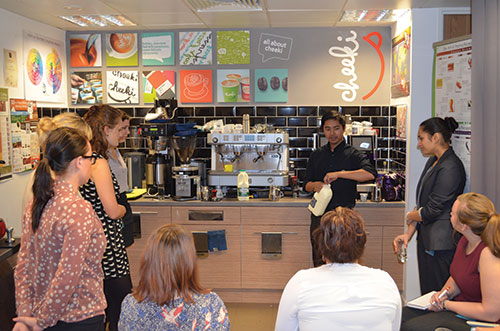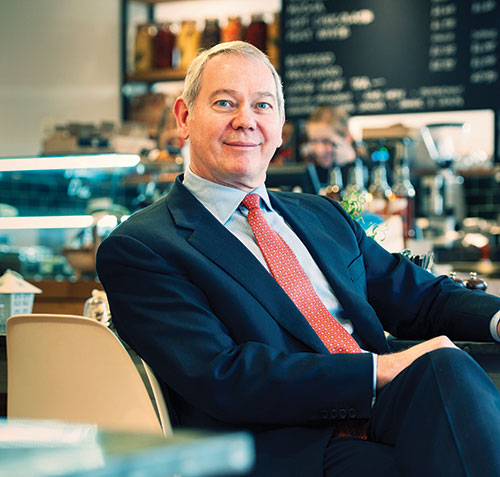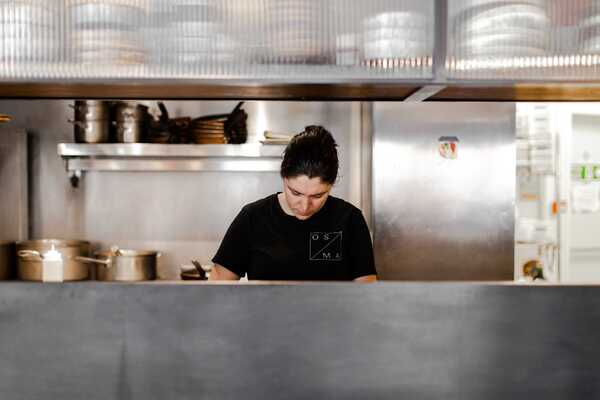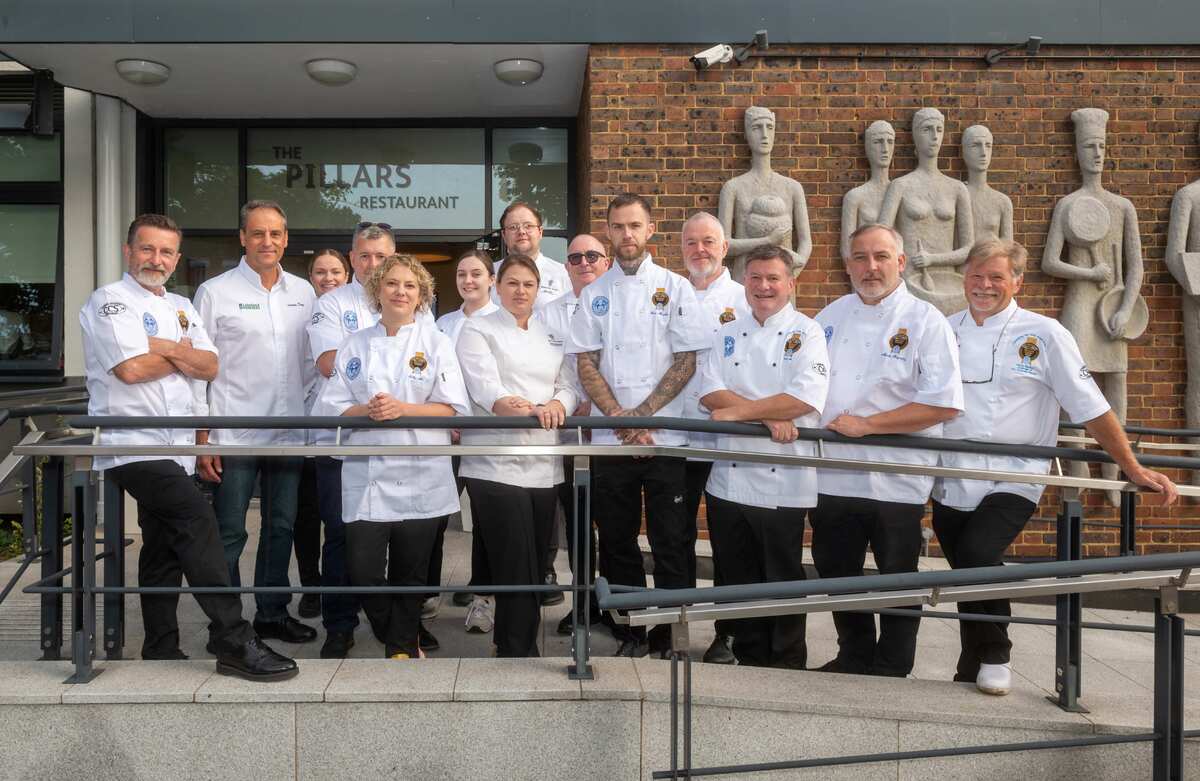How to start a foodservice company
Piers Zangana talks to its success stories to discover the risks, the rewards and how to clinch that first deal
Thinking of starting a catering business, but not sure what to consider? The foodservice industry has doubled in size over the past 20 years, generated in excess of £10.8b and employed more than 270,000 people across the UK, so itâs safe to say that it is a place where entrepreneurs have enjoyed some success.
The industry has changed significantly. Dated perceptions of staff canteens, lowskilled workers and cheap, imported produce are now â" mostly â" firmly consigned to the annals of hospitality.
Instead, weâve seen the introduction of vibrant workplace dining spaces, the progression of well-trained people, and the sourcing of quality produce from our own shores â" many delivered via innovative foodservice businesses created and developed by dynamic and successful entrepreneurs.
Benugo, owned by WSH Group
These entrepreneurs have varied backgrounds. Whether itâs first-time founders unsatisfied with corporate life or serial business- makers who have come to the realisation that the industry offers diverse opportunities, we have seen the creation of a multitude of companies looking to succeed in a largely welcoming, developing and engaging industry.
Their evolution and development has changed the sector. Many of these market disruptors have pushed boundaries, challenged the status quo and improved standards across the board.
However, as with any industry, it has its challenges. Changing legislation, food inflation and fast-changing consumer demands have made it more difficult to operate for some, and maintaining the pace of change can be taxing for even the most seasoned operators.
But those who take the leap and get the product right have reaped the rewards of a competitive sector. As American author Mark Twain once famously wrote: âThe secret of getting ahead is getting started.â So what do entrepreneurs need to consider when embarking on their foodservice journey?
L to R: Madeleine Musselwhite, CH&Co Group; Sue Parfett, Brookwood;
Bill Toner, CH&Co Group; Kate Martin, Brookwood
Determine your values
âItâs all about being true to yourself from the outset,â says Alastair Storey, chairman of WSH, one of the industryâs biggest success stories over the last two decades. As founder of a business that now lists six cross-sector brands and boasts a £590.7m turnover, he has spearheaded a number of acquisitions as well as overseen the organic growth of a number of his companies.
âThe best entrepreneurs I meet are the people that have something burning inside of them that they canât let go. They all share the same desire to make something work,â he adds.
According to Storey, success is not just about having belief at the start of the journey, but also having the courage to stay true to your values. âWhen Keith [Wilson] and I first started the business, we literally sat down and wrote a list of the things that mattered to us â" our core values, if you like,â he says. âThese are values Iâve stuck with until this very day. I will never waver from them.
âWhen we set up, we did our research and knew we had to develop a different supply chain to the rest of the industry to meet our values and develop a business based on local sourcing. It was different and a challenge, but it was important to us, so we stuck with it.â
Foodservice at Gatwick by Charlton House, part of CH&Co Group
Assess the risk
Beyond having this inherent desire to succeed, many entrepreneurs will argue that individuals need to speculate to accumulate, or take calculated risks.
Wendy Bartlett, who set up Bartlett Mitchell with business partner Ian Mitchell in 2000, says: âWhen we first set up, my personal situation meant that I had no major commitments, so I could go out and take the chance. I had worked in the corporate world and decided that it wasnât for me.
âIt wasnât easy at first as you donât have a large operational support structure around you. People thought I was mad, but they were very supportive.â
Having just celebrated its fifth successive year of growth, and a turnover of £32m, Barlett would know.
Storey, who started his business in 2000, adds that while there is some risk involved, success is not limited to those who risk everything to make their fortune. âEntrepreneurs are not all wild risk-takers,â he says. âItâs also about getting the product right and having a little bit of luck.â
Olive Catering Services
Donât let a difficult financial climate deter you
Luck, some would argue, is something you make for yourself. However, there are elements which will naturally be out of the control of businesses, and timing can be everything. Whether itâs recessions, changes in governments or shifts in eating trends â" all will play a part.
âHow you set up or grow your business is a lot about timing and judgement,â Storey says. âWhen I first started, the economy was in good shape, but thatâs not to say that a turbulent economy means that businesses cannot be a success.â
Julian Fris, director of foodservice consultancy Neller Davies, agrees: âDuring a difficult financial backdrop, there are opportunities for caterers as clients will want more value. Caterers can really come into their own and create tailored services which ensure the commercial interests of their clients and customers are safeguarded.â
Being prepared to plan for every eventuality, it seems, is a sensible approach. This flexibility to develop bespoke contract models with customers during the more challenging times, as well as during the glory days, seems to separate the winners from the losers.
Fris says: âThere are always opportunities there for those who are prepared to take the challenge. Even if we are not in a âboomâ time, and contract models may have made it less easy to make money, itâs not to say that they donât exist. Planning and re-planning is important as market conditions can change.â
Bartlett adds: âDuring the recession â" when itâs the toughest market, you get the best opportunity because people are hungrier for change and value. Your unique selling point has a heightened value in depressed times.â
A Bartlett Mitchell canteen
Itâs a diverse industry, so choose what you feel passionate about
So once youâve decided to make the move, and realised the calculated risk, whatâs next?
According to the recent British Hospitality Association (BHA) Foodservice Market Report, foodservice businesses now feed four million people a day. In an industry spanning anything from workplaces to hospitals, schools, military bases and wedding venues, deciding on a target market can be challenging.
According to Sue Parfett, managing partner of education caterer the Brookwood Partnership, which merged with CH&Co Group this month, choosing your sector is as much about what your passion is, as well as the commercial opportunities.
âWe spent some time researching different parts of the industry and saw a real need for change in the education sector.
âWe saw some shockingly awful food and kitchens that had been designed with freezers and fryers rather than fridges and ovens. Our approach was to put chefs back into school kitchens and offer modern food styles that children wanted to eat.â
Wendy Bartlett
Catering vs retail â" the industry moves quickly
Choosing your core product sometimes isnât that simple. Some argue that the segmentation of traditional foodservice markets isnât as it once was. Caterers have, for some time, had their eyes on the retail space, and this has created a previously unseen level of competition. What does this mean for traditional structures and models, and do companies need to ensure that they take a different approach when considering their product?
Fris explains: âTraditional structures and models are being challenged daily. Those considering starting in this arena need to be geared up to tackle the traditional âretailersâ too. Gone are the days where food companies played only in their own sector. Everything is up for grabs now.â
Fris talks about the necessity of having a clear idea of what the product or service is, as well as the importance of creating a marketplace where everybody can compete for contracts.
He says: âWhile we have seen some consolidation in the market with so many mergers and acquisitions taking place, we need a healthy churn of newer businesses to maintain growth.â
ZSL London Zoo, where Ampersand (part of CH&Co Group) provides the catering
The regional approach
Outside ensuring a business takes a multifaceted approach to its core product, some believe that taking a regional approach is actually the answer to enabling a new company to grow. The London market is competitive and, some argue, saturated â" so some entrepreneurs have entered the industry by starting in less crowded markets.
Damon Brown, managing director at Olive Catering Services, which initially launched in the Midlands in 2004, says: âWhen we founded the business, we made a conscious decision to target contracts which were an hour from the office, which was very close to where we lived.
âWe had a core set of values and wanted to build our business infrastructure in a manageable way so, in the early days, this meant targeting areas we knew well. It made sense to start somewhere close to home.â
The approach has paid off. The company now has a turnover of approximately £25m, operates across the UK, and recently picked up its first London-based contracts with Vitality, after initially working with the specialist health and life insurance provider in its Stockport office.
A WHS Group café
Choose a model that works for you
Sector focus and location is undoubtedly important; however, the structure an organisation takes from the outset could be the key differentiator for a business, and ultimately, the difference between success and failure.
Evidence suggests that partnerships are important. Whether its William Baxter and Alastair Storey, Wendy Bartlett and Ian Mitchell, or the late Robyn Jones and Tim Jones and Bill Toner at the recently formed CH&Co Group; there are many examples of partnerships that have facilitated growth.
Bartlett says: âDepending on the type of person you are, you need somebody to compliment your skills. If you are great at selling, you need that strong financial influence to have that balance. A partner can be very important when setting up a business.â
In the current climate, great partnerships alone cannot guarantee success. Choosing the correct financial model to launch is crucial. Tim Jones, chairman at CH&Co Group, says: âRobyn and I took the low-cost option when we set up Charlton House 25 years ago, with a £5,000 investment and lots of hard work.
âThe other route is the high-cost one, and that involves borrowing money or investing far higher sums of your own money. This would be to either set up the team and systems from the outset, or even buy your way into the sector by acquiring an existing company.â
However, the industry has changed considerably since then and legislation means there are now other factors to consider. Jones explains: âYou would need much more investment today because costs are higher, there is far more red tape, and you would need to employ more people from the outset or out-source specialist tasks.
âYou need policies and procedures, health and safety systems, finance systems, a payroll service, IT, marketing capability â" the list goes on. This all comes at a cost and a huge amount of work. Of course, you also need to be able to support yourself financially until you start making money.â
Alastair Storey
Winning the first contract
With all the investment in place, and the company structure agreed, the real challenge often comes with winning that first contract. A lack of reference points, and no goodwill banked, it can be a real task to convince clients to procure the services of an âuntestedâ business.
Chris Stern, from Stern Consultancy says: âThe all-important first contract can often be the most challenging. Convincing a client to hand over an integral part of their business to an untried and inexperienced catering business can be very difficult at times. This is where relationships are often really tested.
âThere are, of course, other options which lead to the development of new businesses. Weâve seen some companies buy others to get into the space. Itâs highly competitive but not impossible, as long as people truly believe in their product.â
Fortune favours the brave
With so many variables in play, its safe to say that the industry is not for the faint-hearted. Resilience, dedication, as well as an inherent and unshakeable belief in the product has delivered some remarkable successes for many wealth creators.
Bartlett sums it up: âI soon realised that being pragmatic and realistic is very important in this industry. There were, and still are, setbacks at times, but if you believe in what you are doing, you need to move on quickly to be successful.â
So, the answer it seems, lies within the individual, and maintaining an unflappable relationship with oneâs own values.
As Twain so eloquently put it: âA man cannot be comfortable without his own approval.â Just make sure you stick to your principles, and that the wind doesnât blow you off course.
Â



